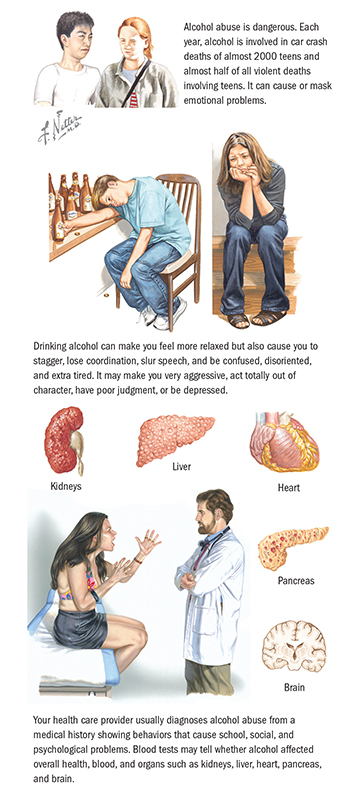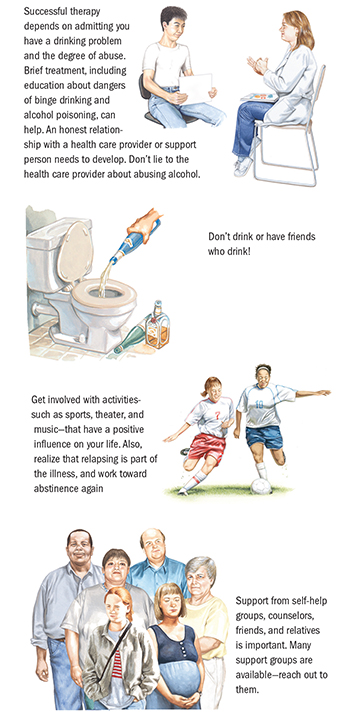
Alcohol is one of the four most common causes of death in the United States. Each year, alcohol is involved in death in car crashes of almost 2000 people younger than 21 and almost half of all violent deaths involving teens. Alcohol can cause or mask emotional problems, such as anxiety or depression. Teens who drink have trouble paying attention. They’re more likely to have unprotected sex or have sex with strangers. The younger people are when they start drinking, the more likely they’ll have an alcohol problem. Drinking can also increase the risk of using other drugs (marijuana, cocaine).
Teens use alcohol because they’re curious and want to feel good, lower stress, fit in, and feel older. Some teens have trouble managing impulses, emotions, and thrill-seeking behaviors. Parents and other adults often use alcohol socially, so teens may think that alcohol is harmless.
Teens often deny that they have a problem or try to hide symptoms. Alcohol is a depressant, meaning it slows down the brain. Teens can feel more relaxed or less anxious, but they may also stagger, lose coordination, slur speech, and be confused and disoriented. They may be friendly or very aggressive. They may act totally out of character, have poor judgment, or be depressed. They may also lie, steal, break curfew, and have mood swings. Physical symptoms related to long-term alcohol damage include unsteadiness, nausea, stomach pains, diarrhea, vomiting, sweating, palpitations, blackouts, and yellow skin (jaundice) from liver disease.
The health care provider usually diagnoses alcohol abuse from a medical history. This history will show behaviors that cause school, social, and psychological problems. Blood tests may tell whether alcohol affected the blood, kidneys, liver, and overall health.

Treatment varies depending on the degree of abuse. Brief treatment, including education about dangers of binge drinking and alcohol poisoning, can help abusers. Alcohol-dependent addicts usually need more help, such as detoxification (stopping drinking), medicine, counseling, and self-help group support.
Help with school, peer pressure, other medical problems, and coping skills is important. It’s best to talk to parents, or to doctors, school counselors, clergy members, or adult relatives. Teens can find it hard to say no to drinking if friends drink. Different methods (saying no with or without explanations) work for different people.
Contact the following sources:
The best place to get additional information about alcoholism is at your local AA central office. In addition, most mental health centers can also give information, or you can check out the following websites.
Copyright © 2016 by Saunders, an imprint of Elsevier, Inc.
Ferri’s Netter Patient Advisor